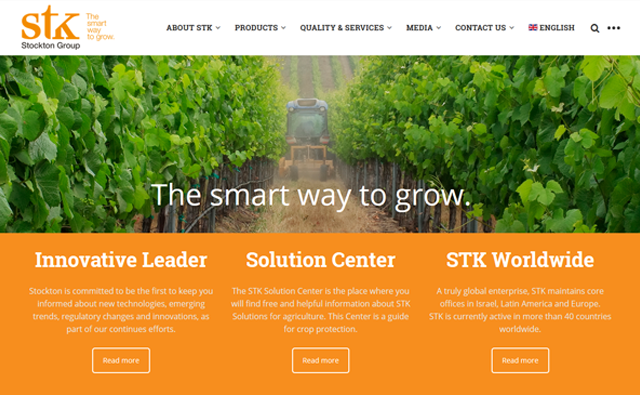Industry News, Agriculture & Feed, Biopesticides
Taking Stock in the Future of Biopesticides

Industry News, Agriculture & Feed, Biopesticides

Recognizing the biopesticide market is truly worldwide, STK Stockton maintains offices in Israel, the United States, most of the countries in Latin America and some Asia/Pacific countries.
STK traces its roots to 1994, when Peter Tirosh, who started his career with the UN FAO before joining Makhteshim Agan for 23 years. He left Makhteshim Agan to found AGRIMOR, which later evolved into STK Stockton. Tirosh passed away earlier this year.
AgriBusiness Global had the opportunity to interview Guy Elitzur, current CEO of the 22-year-old company based in Petah Tikvah, Israel, about the biopesticides market and the role the company plays.
“Biological pesticides will be integrated into the conventional spraying programs more and more, and the IPM approach will be increasingly integrated into the different regulatory authority approaches,” Elitzur says. “The IPM approach will gain its place in spraying programs for row crops and will bring different values to row crops.”
Finding a place in row crops is key for the segment’s continued growth. STK currently develops tens of different active ingredients in different formulations and packaging configurations. That said, the company will continue to develop its pipeline working to bring new products to market.
“We will accelerate our efforts to bring more innovative biological AIs with different modes of action and other ways of applications to extend our offer to the farmers,” Elitzur says. “Having vast experience in chemical products, the integration of biological as part of the IPM approach, certainly creates a workable challenge going forward.”
Regulatory and consumer pressures are driving growers to produce crops with pesticides deemed more environmentally friendly. Biopesticides certainly fit that criterion.
“The innovative products in our pipeline will play an important role in crop protection, providing a key solution to insect pest and disease problems, yet it will be safe for the environment and for human use,” Elitzur says. “Stockton explores the potential capabilities of plant extracts with the intention of integrating them into conventional spraying programs.”
While the concept is simple, the execution is not. “Developing new crop protection technologies, getting them to the market, and working out the best ways to use them as part of IPM, is not simple,” Elitzur says. “During the last decade, Stockton has been focusing on the research and development of bio-products for the agriculture industry besides its already well-known products, namely Timorex Gold fungicide.
“We think that as long as biopesticide companies position their products with scientific backup and agronomical support, together with the increasing awareness and regulatory change, this niche will gain wider place in the agriculture industry.”
It will take more than just quality products.
“Education is a key element in any industry when bringing innovation into the market, and our case is not different,” Elitzur says. “We are investing a huge amount of time, money, and efforts in educating the different stakeholders about our product and to position it. It goes from our different partners and distributors in the markets all the way to the farmers, from field days to conferences and exhibitions. We have training sessions to the technical teams of our distributors as part of passing our knowledge and experience.”
STK understands continuous innovation is a key to growth. The challenge of unveiling innovative plant solutions that safely produce sustainable, healthy, high-quality food can come from a variety of sources.
“One of the reasons to raise capital last year was to broaden our offer to the farmers based on our vision to bring solutions for sustainable agriculture and aquaculture,” Elitzur says. “Part of these solutions will come from our own R&D efforts and others will be based in different M&A targets that we’re evaluating as we speak.”